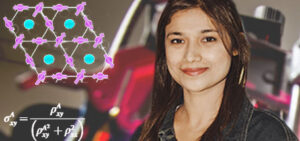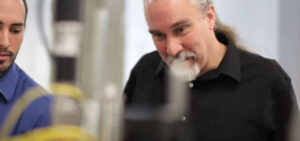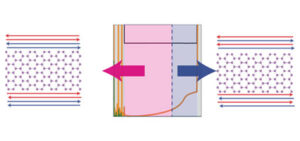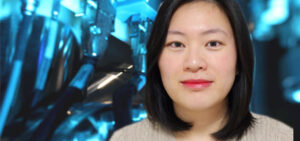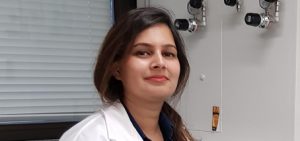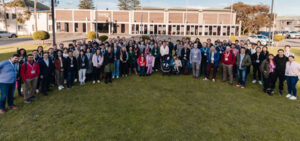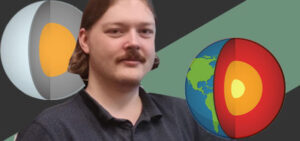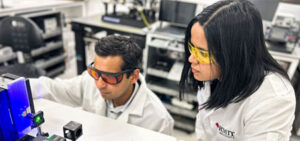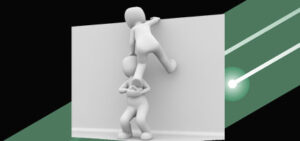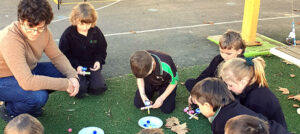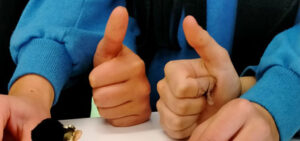Collaborate
Subscription confirmed
 WELCOME TO FLEET NEWS with regular updates from the Australian Research Council Centre of Excellence in Future Low-Energy Electronics Technologies.
WELCOME TO FLEET NEWS with regular updates from the Australian Research Council Centre of Excellence in Future Low-Energy Electronics Technologies.
Each edition of FLEET News brings a selection of research news from around the Centre, a wrap-up of FLEET stories in the media, outreach, and other news regarding FLEET researchers and research.
Catch up on past issues of FLEET News.
Michael Fuhrer
Director, FLEET
ARC Centre of Excellence in Future Low-Energy Electronics Technologies
Following the news
 If you’re on Facebook, Twitter or Linkedin, you can follow our accounts to stay up to date with FLEET news and events. You can also follow news and events at FLEET.org.au.
If you’re on Facebook, Twitter or Linkedin, you can follow our accounts to stay up to date with FLEET news and events. You can also follow news and events at FLEET.org.au.
If a friend or colleague might be interested in our news, send them this link. Or let us know and we’ll invite them.
The challenge
 The big challenge that FLEET is addressing is the increasing energy load of computation, which is currently at least 5% of world electricity use, and doubling each decade.
The big challenge that FLEET is addressing is the increasing energy load of computation, which is currently at least 5% of world electricity use, and doubling each decade.
To date, the amount of energy being burned by computing has been kept in check by a phenomenon known as Moore’s Law, whereby the number of chips in a given area doubles every two years. But we are fast approaching a limit for Moore’s Law.
Current computing is based on semiconductor chips that each burn a tiny, tiny amount of power as they ‘switch’. FLEET will develop switches that will burn almost zero energy, operating at room temperature.
Our research
FLEET will use new concepts for electronic conduction without resistance to create a new generation of ultra-low energy electronics.
We will develop materials in which electricity can flow with minimal resistance and dissipation of heat, and devices in which that electric current can be switched on and off.
FLEET’s three Research Themes are:
- Topological materials (led by Alex Hamilton, UNSW)
- Exciton superfluids (Elena Ostrovskaya, ANU)
- Light-transformed materials (Kris Helmerson, Monash)
And this research is underpinned by two Technology themes:
- Fabrication of atomically thin materials (Xiaolin Wang, University of Wollongong)
- Nanodevice fabrication (Lan Wang, RMIT)
About FLEET

With over $40M investment from the ARC (Australian Research Council) and contributing organisations, FLEET will make a significant global impact in the electronics and energy sectors.
Headquartered at Monash University, and an ARC Centre of Excellence, FLEET has 19 chief investigators at seven Australian institutions, 17 partner investigators at 13 institutions worldwide, and will have over 100 higher-degree research students and postdoctoral fellows.
The highly interdisciplinary team includes some of Australia’s best researchers in atomic physics, condensed matter physics, materials science, electronics, nanofabrication and atomically thin materials.
By building strategic and strong partnerships with Australian and international industry, research institutions and government, FLEET will build capacity for advanced electronics research in Australia and train the workforce for the next generation of electronic materials researchers and future semiconductor industry.
Recent news
A note from previous FLEET PhD candidate Dr. Wafa Afzal, still researching novel materials, now at Archer Materials I was a PhD student at FLEET, based at the University of Wollongong under the supervision of Prof. Xiaolin Wang, studying the electrical and magnetic properties of topological Weyl semimetals. I’m still researching novel materials, now in the Quantum team at Archer …
Here’s the problem: the more we use computers, the more energy that’s required. Driven by a deep intellectual curiosity, Prof Fuhrer (Monash University) was drawn to science at an early age and now has a passion for mentoring the next generation of scientists, teaching them how it pays to be patient. New video out from the Australian Academy of Science, …
‘Trimming’ the edge-states of a topological insulator yields a new class of material featuring unconventional ‘two way’ edge transport in a new theoretical study from Monash University, Australia. The new material, a topological crystalline insulator (TCI) forms a promising addition to the family of topological materials and significantly broadens the scope of materials with topologically nontrivial properties. Its distinctive reliance …
A recent UNSW-led paper published in Nature Communications presents an exciting new way to listen to avalanches of atoms in crystals. The nanoscale movement of atoms when materials deform leads to sound emission. This so-called crackling noise is a scale-invariant phenomenon found in various material systems as a response to external stimuli such as force or external fields. Jerky material …
Currently applying materials skills learned at FLEET/RMIT to improve solar technologies, at CSIRO Greetings from CSIRO! I was a PhD student at FLEET / RMIT from 2017 to 2020, working on the development of piezoelectric and sensing applications of atomically thin materials. “The thing I enjoyed most about FLEET, other than the technical aspects of my work, was the sense …
Just under 120 members, family and affiliates gathered in Lorne Victoria this month for FLEET’s 2023 annual workshop, which featured 35 scientific talks (over 60% of them by ECRs), 30 accompanying family (17 kids), a cultural celebration dinner, karaoke, quiz, lawn bowls, and lots of unstructured time for collaborative discussions. Invited presentations included: Nicola Gaston, MacDiarmid Institute Mateusz Król, Warsaw …
An exciting partnership between FLEET and APR-intern will fund new route to gain valuable ‘on the floor’ industry experience for FLEET PhD/Masters students, increasing job skills and leveraging Australian scientific expertise in industry, with funding supporting the placement of research students with industry partners. In addition to injecting fresh scientific and problem-solving energy into participating industry workplaces, the program will …
Homogenous liquid-metal nanodroplets achieved with high-temperature molten salt Australian researchers put planets in the palm of the hand Liquid metal, planet-like nanodroplets are successfully formed with a new technique developed at RMIT University, Australia. Like our own Planet Earth, the nanodroplets feature an outer ‘crust’, a liquid metal ‘mantle’, and a solid ‘core’. The solid intermetallic core is the key …
First published at RMIT Researchers have created a small device that ‘sees’ and creates memories in a similar way to humans, in a promising step towards one day having applications that can make rapid, complex decisions such as in self-driving cars. The neuromorphic invention is a single chip enabled by a sensing element, doped indium oxide, that is thousands of …
A new expanded mentoring network vastly increases the experience pool available for ECRs and others in 12 participating ARC Centres providing: structured mentoring with ongoing support and oversight access to a range of resources and peer-mentoring groups large, diverse pool of mentors and mentees for both researchers and professional staff. Allowing members of the participating Centres to access mentors in …
Learning about ‘wavy’ stuff you can’t see, smell, taste or touch can test students’ intuitive understanding of the world. FLEET’s latest Forces and Energy teacher resource examines energy from the physics of Newton to Einstein, to the wavy behaviour of sub-atomic particles such as electrons. Students learn how energy is crucial to our understanding of how everything in the universe …
Leading materials physicist and FLEET Director Prof Michael Fuhrer has been recognised for his contributions to science, elected a Fellow of the Australian Academy of Science. Professor Fuhrer is one of 20 researchers elected as Fellow of the Australian Academy of Science, announced today. Prof Michael Fuhrer is an international leader in study of the electronic properties of 2D and …
Teaching energy, releasing creativity, and inspiring future scientists FLEET and Monash volunteers used catapults, graphite circuits and diffraction goggles to create challenges for 250 Mater Christi College students competing to win their annual STEM Cup. For the STEM Cup challenge, which is judged on teamwork, innovation and communication, FLEET designed two hands-on workshops that got middle and senior secondary students …
FLEET is pleased to announce that Dr Torben Daeneke is now a Chief Investigator in FLEET. As a Scientific Associate Investigator in FLEET (RMIT node) since the outset of the Centre, Torben and has been a prodigious contributor to FLEET’s research effort as well as FLEET’s governance. “I welcome the opportunity to become a FLEET Chief Investigator,” says Torben. “I …

